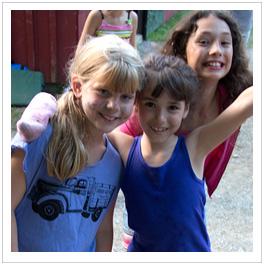Preparing for Camp
I tell you the girl I put on the plane is NOT the same girl that got off. She is transitioning into Middle School well and is so much more willing to try things, just to try, no matter what happens. What a gift for all of us.
- HVC Parent
If you are just beginning to explore the idea of attending a summer camp, the message below provides insights into a detailed and sensitive approach that helps children families support their children. You can also tell your child about the many resources providing support (parents, staff, etc.) for them while at camp.
For first-time enrolled families, the weeks at camp represent a big step for everybody. Each year, Meg and Peter help families prepare for summer at camp. Read Peter and Meg's letter to this summer's families, below...
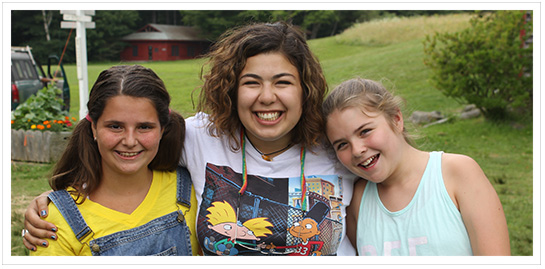
Dear Parents,
For a child leaving home, there is much that is different about camp, but for all of our campers, one thing remains constant as they make the transition from home, neighborhood and school to our little corner of Maine: themselves! The most familiar aspects of their lives: their senses, prior experiences, personal resources, etc. will help children upon arrival here. Here we have listed what you can do to help your child identify ways to use his or her strengths to adapt themselves to a new environment and create an independent identity at Hidden Valley.
ANTICIPATING CAMP
This spring, campers may wonder, "What will my activities be like?" "Am I going to have fun?" "Who will my friends be?" Most everyone, whether they have been to sleep-away camp or not — and whether or not they've been to Hidden Valley before — has similar concerns. Campers benefit from encouragement — and a reminder about how brave and wonderful they are to take the step they are taking.
Encourage your child to form friendships, try new activities, and confide in staff as needed. We urge campers to find someone here— one of us, a counselor, an instructor — with whom they feel comfortable. So, let your child know that his or her efforts this summer will be enthusiastically supported by our staff, a talented and caring group of 90 people from across the United States and around the world.
However, as noted above, adults' most important contribution may be to help children focus on what they can do to make the summer successful. The overall approach outlined in this message encourages campers to take responsibility for their success at camp, providing ideas on exactly how this sense of responsibility can be acquired... Basically we are saying what works at home will work at camp.
PERSONAL STRENGTHS
As campers begin to imagine themselves in the camp setting it's time to identify the inner resources that will provide steady support. Help them figure out strengths such as listening, a work ethic, creativity, being organized, thoughtful, a good friend, etc. Then talk about how these might help them. For example, a particularly empathic child maybe able to help another child who is sad. A good dancer or tennis player will feel some immediate accomplishment. An organized camper will get their bed area set up to feel comfortable and look really"cool." An extroverted child knows s/he will make friends. These are foundations upon which a camper can build a sense of him- or herself in a new social context.
It's probably helpful, without being critical, to identify areas in which a child may want to work on the flip side of these strengths, campers' "group-life" challenges. For example, enthusiastic children need encouragement about exactly how and when to give others space. A child who is self-possessed also has many advantages, but may benefit from tips about how to reach out and respond to others in a new setting.
FRIENDS AND OTHER KIDS
Clearly this is central to camp life and each child has his/her own way of going about making friends. Concrete advice is helpful, along with the reminder that other children are in the same boat and will be looking to connect. Ask your child how s/he has made friends in the past and then help him/her figure out how those moments can be repeated on the bus to camp, at meal times, in classes, etc.
SOME OTHER MESSAGES THAT MIGHT BE HELPFUL
If you are shy about making new friends, then learn about them by being a good listener. You don't have to be best friends with everyone, but we all trust that all children will treat each other respectfully and cooperate in the group. Some people have lots of friends, others one or two; either is OK...
For returning campers or those coming here with a friend, remember that staff will expect all children to reach out to other campers. This spring, please have children come up with ideas about how they will 1) include others as they maintain existing friendships, and 2) negotiate these pre-existing friendships in specific settings(at the dinner table, at free time, getting ready for bed, etc.) so that friendships do not become exclusive.
GROUP LIFE
A big attraction at any camp, but the demands placed on campers may come as a bit of a shock. At camp more than at home (fewer people) and school (where individual achievement is often the focus) cooperation, self-awareness and helping out all become quite important.
Some children may need a reminder that we all expect them to respond to counselors and teachers here. Campers also will benefit from hearing about daily chores in which they will engage: personal tasks such as making their bed, putting clothes away, and a rotating cabin chore such as sweeping, litter pickup, etc. Everyone is expected to pitch in.

FEELINGS
What does your child do at home if s/he is feeling sad or a little restless or has something on his/her mind? Have your prospective camper identify how they process feelings and then talk about the ways these techniques can be brought into camp. For example, a child who needs alone time to "recharge" can be told that rest period is a great time to unwind and have some space.
GETTING HELP
Ask your child, "How do you get help at home or school, with friends, during after school activities? Well, it'll be the same at camp, only with new people who are here to assist you with any sort of problem." Mention the presence of 3-4 counselors in the cabin and the two of us.
GIVE YOURSELF TIME
Oh, would that we adults consistently remember this basic "tip" when we go somewhere new, take on a new job or relationship, etc. Kids benefit from this sort of advice as well. Have your child brainstorm what will be new and different at camp: Bed, bathroom, food, kids, adults, etc. And let them know that, if they give it a chance, all of this will soon feel familiar.
HOMESICKNESS
This issue speaks to the core of the camp experience. Remember that forming an independent identity and having fun away from home can be a life's work, so there will be bumps along the way. Camp is a good place to start.
In addition to everything mentioned already, some tips to help establish the basis of a successful adjustment to camp… You might discuss the sorts of things you and your camper will write about to each other during the summer. Or together choose family photos to send children to camp with. Or plan a diary to record camp experiences that can be shared after the summer. Anything to include the family as a supportive part of an independent camp experience. Camp thus becomes part of winter family life, and you complete your child's independent time here.
Each summer we find a very few children who suffer from homesickness. Ultimately — working with their parents, counselors, and camp directors — this brave bunch finds the resources needed to turn a challenging start into a relaxed and happy experience accompanied by a sense of accomplishment and independence.
Our staff responds by recognizing that it is natural to miss home. We work with each camper individually, listening and talking about his/her feelings. We encourage children to become full participants in camp life. Of course, we also notify parents and have children speak with them.
During the summer, a small handful of you will hear a plea to leave camp. This may be your child's way of saying "No one takes care of me better than you, mom," Please don't make any "private deals" such as, "Just call me if you are unhappy and you can come home." Instead, accent the positive, and respond by saying that counselors and directors are at camp to look after children and help them with these feelings. We've found that campers make the best of their summer experience when parents fully support their efforts to take risks and succeed.
We ask that you work with us to help make the camp experience as rewarding as possible for your child. Make it clear that you'd like him or her to take advantage of opportunities at HVC. Encourage children to take responsibility for themselves here. Help them remember everything they can do to make their summer a good one. With all of our support, a positive result — involving independence and connections to camp people — can be expected after a few days.
FINALLY (FOR GROWNUPS)
We recognize that the camp experience is a special one for parents too, and we support your efforts over the next months. We appreciate your desire to support and enjoy the camp experience yourself. Here are some thoughts along these lines… First — before or during the summer — you should always feel free to call us whenever needed… Also consider speaking with your child's counselor after camper arrival is something that we also gladly arrange… And finally, plan a mid-session visit allowing you to share in the camp experience as your child hosts you at "their camp…"
Here's hoping that your independent child will come home from camp ready to hear about your adventures while he or she was at HVC. Have a wonderful summer!

Don't worry that children never listen to you; worry that they are always watching you.
-Robert Fulgrum
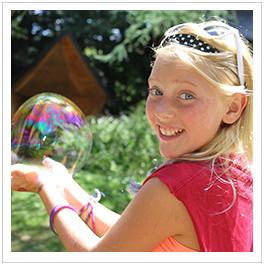
My kids are fine. And part of the reason they ARE fine is because of all the summers they have had under your watch, so thank you for that.
- HVC Parent
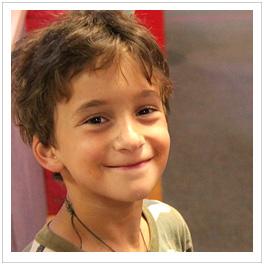
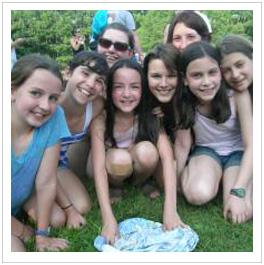
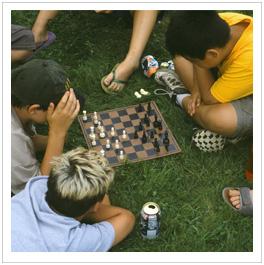
How to Talk about Camp
- Rather than one big "Camp Talk," have your pre-camp conversations a bit at a time as the topic comes up in the context of family life.
- Make sure these conversations allow children to talk about their thoughts and feelings in anticipation of the summer.
- Contact us if there are any unanswered questions. Campers can email us as well.
Aside from all the programs, fun and excitement, you provided just what I was hoping for from camp. An alternative to her usual environment, a new community, and the realization that the world is bigger than her classroom. You helped her feel like a citizen of her new place.
- HVC Parent
What to Talk About
Some great topics include:
- Classes. What to take, new activities to try and take a chance on.
- Other kids, where they are from, what they might be like, more on friendship below.
- Geography: Of Maine, our area and camp itself (using the map we have sent.)
- The first 2 days at camp, info about which can be found in the Camper Handbook.
- Cabins, and what goes on day to day at camp
In each of these areas, there are similarities to life at home that can help younger campers imagine themselves in a new situation. For example, there are classes at school, wakeup routines at home, and routes children travel in their neighborhoods.
Adapting to "no electronics" at camp
We can expect that some campers will find it a bit challenging to adjust to "no screen time" while away from home. Does your child have frequent access to a device? If so, pre-camp attention may be required.
Please prepare your camper so that they can make the best possible adjustment to camp. Talk about the upcoming transition with them - along with other aspects of camp life that will be new and different (and fun!) like friends, food, new important adults, etc. Then consider the following steps...
- Reduce screen time (expl: not at meals, X number of minutes, etc.) so that your camper is not forced to go “cold turkey” on the first day of camp.
- Put alternative activities in place at home, solo or with others.
- These substitutes can be “campy”… Make s'mores on the stove, sing songs, take a quick "nature hike" in the neighborhood. This gives your child confidence that they can “do it.”
- Pack children’s bags with alternatives that provide satisfaction at camp when there is down time.... Books, writing, drawing, legos, crafts, etc.
- Have your camper explore these options prior to camp so they are comfortable and enthusiastic about them once at HVC.
- Experts advise that parents model these new limits as they pertain to adults’ electronic use. Think about those non-electronic activities you can engage in with your camper and read what experts have to say about parents helping children.
Learn about our "no devices" philosophy.
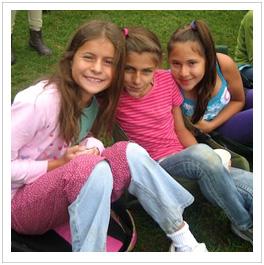
The boys have so much more confidence. This has been the best year of their lives since they've been with you.
- HVC Parent
